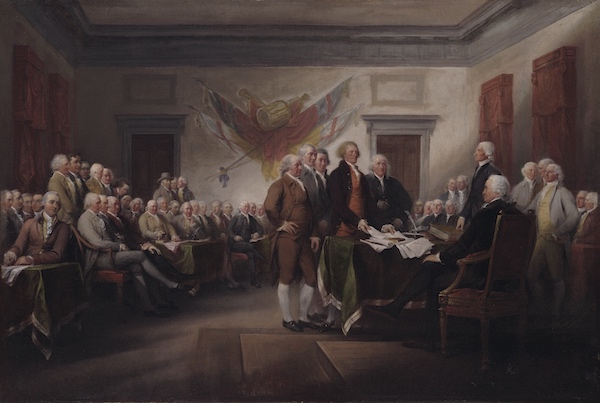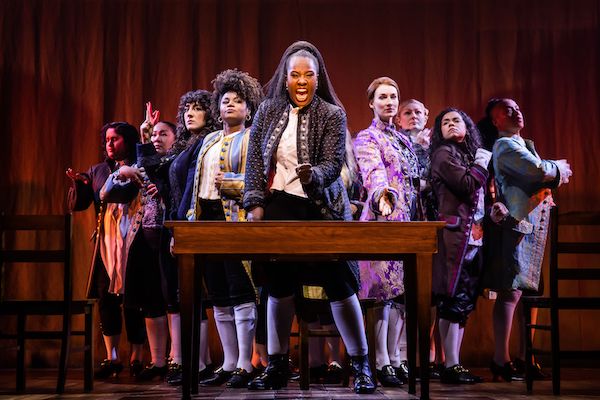Theater Commentary: “1776” — American Theater Jigs as Democracy Dies?
By Bill Marx
Maybe I am an alarmist and the rich and powerful know something the rest of us don’t. Perhaps the midterms will not put another nail in the coffin of democracy. Apparently, it will be business as usual for the A.R.T. and other American theaters — until it can’t be.

John Trumbull, The Declaration of Independence, July 4, 1776, 1786–1820, oil on canvas, 20 7/8 x 31 inches / 53 x 78.7 cm (Yale University Art Gallery)
I was inspired to write this commentary after I read the opening of David Greenham’s review of the American Repertory Theater’s production of 1776. I have not seen the show, so this is not a criticism of the staging, which runs through July 24 at Cambridge’s Loeb Drama Center. It is fine by me if this revival of the 1969 musical, after it goes to New York in September, wins a slew of Tony Awards and rakes in enough ca-ching to delight the hearts of the creative team, particularly co-director Diane Paulus, Harvard University, and the show’s various backers. May it be boffo on Broadway.
No, what got me thinking was the timing, that 1776 is being revived now, and what that says about the detached relationship of American theater to our political situation, which is seen by many knowledgeable people as moving toward a crisis, constitutional and otherwise. Greenham juxtaposes the photo of the January 6 rioters tramping in front of John Trumbull’s painting of the signing of the Declaration of the Independence in the US Capitol with the A.R.T.’s revisionist production of 1776. That contrast more than ironic. It may well be revelatory. [The public hearings held by the U.S. House Select Committee to Investigate the January 6th Attack begin this week. They will be more dramatic than anything we have seen on stage for a very long time.] There is the strong possibility that, at the very time Paulus and company are bringing 1776 to New York, democracy will be in its death throes. A musical that celebrates the assertion of American independence – in this case modernized via a multiracial, multigenerational cast that includes only female, nonbinary, and transgender performers –may, depending on your point of view, either become a black comedy or a wizened fairy tale. We might be turning our backs on our hallowed democratic ideals. Paulus and the production’s backers shouldn’t panic: 1776 should do well at the box office even if democracy goes down for the count. Ticket buyers will view the musical as a work of nostalgia, an entertaining exercise in singing and dancing through a historical event that only wistfully pertains to the present.
My reasoning? If the Republicans do well in midterms in November – as predicted — then they will have more power to carry out their documented strategy to undercut democracy through ongoing efforts to deny the legitimacy of Donald Trump’s 2020 election loss. Evidence of the deadly serious threats to voting, through suppression, poll worker intimidation, etc, can be read about in detail in many mainstream magazine and newspapers, from The Atlantic and The New York Times to The Washington Post and The New Yorker. It is not just left-wing malcontents who are fearful — moderate Democrats, including Barack Obama and others in his administration, and republicans of integrity, such as Liz Chaney, are also deeply apprehensive. Even Fox News is concerned about “election integrity.”
As for America’s theater companies, not so much. Do they keep up with the news? They market talk aboutcaring deeply about their communities and the value of civic virtues, but there has been little serious acknowledgement (on or offstage) of where our politics are headed. Granted, why should they worry? Escapism does well in authoritarian countries — they love musicals in Russia. When our theaters (at least in the Boston area) do shows that deal with current events they tackle issues raised by intolerance of minorities and ongoing racial injustice. And that is necessary work – even if many of these efforts just check off the right boxes — though if democracy doesn’t survive, or languishes on life support, those problems and many, many others will be left to rot. The somnambulism of American theater reminds me of my favorite line in Ibsen. Judge Brack’s incredulous exclamation that “people don’t do such things” after he learns that Hedda Gabler has shot herself. Make abortion illegal, pass hundreds of laws against the rights of the LGBTQ+ population, enrich fossil fuel companies beyond their wildest dreams, minimize the climate crisis, undermine democracy — yes, our politicians are working toward those goals and there is more to come.
Dramatists were not always so complacent. Shakespeare, Jonson, and the Greeks warned about the rise of tyranny. Bertolt Brecht wrote dramas that railed against Hitler while he was in power. Where are our descendants of Ibsen, Shaw, or Churchill? Playwrights whose scripts probed people like us — the well-off theater-going crowd — people who are complicit but indifferent, clueless, or in denial. Maybe there are scripts like that out there and our theater companies are afraid to produce them. Being challenged or discomforted is not what sells. Apparently, theater is there to make you feel good about how empathetic you are.

Sushma Saha, Sara Porkalob, Mehry Eslaminia, Gisela Adisa, Crystal Lucas-Perry, Elizabeth A. Davis, Becca Ayers, Brooke Simpson, and Oneika Phillips in 1776, playing now through July 24 at American Repertory Theater. Credit: Evan Zimmerman for Murphy Made.
So 1776 might well be playing in November, after the Republicans have garnered enough muscle to further their plans to scuttle democracy. To its credit, the A.R.T. has attempted to reach out to the local community, but these public conversations are symptomatic of the disconnect between theater and reality. ince May, the A.R.T. has been sponsoring, along with The Network of Arts Administrators of Color (ArtsBoston), Declaration Reclamation, a series of free workshops, conversations, and gatherings across Greater Boston. The question under discussion: “How is my story a part of American history?”
Amplifying underrepresented voices and stories that are glossed over in American history, the participatory events will engage minds and bodies to collectively reclaim space in the story of America, bridging the gap between the histories we are taught and the histories that define us.
All that sounds of interest, and the wrap-up event/picnic, “Celebrating Our Future” on July 23 at Boston’s Harbor Island, will no doubt be fabulous. But Declaration Reclamation does not confront the elemental issues 1776 raises at this moment. Democracy itself is in peril via voter suppression, gerrymandering, organized violence at the polls, the possibility of a future presidential coup, etc. We should be concerned about the “underrepresented voices” in history. But what about talking about the ways tha segments of “the people” are being robbed of their opportunity to vote — today. Aren’t issues like that worth taking on given the show inspiring the confabs in the first place is about the struggle for freedom? Without a credible democratic process the “underrepresented voices” will be squashed, their history buried. David Greenham also raises a good point in his review: 1776 is of value at this moment of our peril because it is about how representatives with clashing views can reach a compromise. Of course, these and other confrontations with current events might actually spark debate, perhaps even inspire political action. The uncontroversial limits of Declaration Reclamation have been shaped to cater to the play-it-safe sensibilities of fat cat donors and ‘woke’ government funding agencies.
With resources comes responsibility. Many theaters are struggling to survive, but the American Repertory Theater is supported by one of the wealthiest universities in the world. The theater has chosen to stage productions (primarily musicals) geared toward pleasing Broadway audiences and that is its right: why shouldn’t the privileged and well-heeled strike it big in New York? But it is fair to ask if a major regional theater, at this time, should be committed to entrepreneurism. Will tourists paying $100 a pop for Broadway tickets to see 1776 (the story of America’s struggle for freedom) think about challenging repressive laws and fighting the forces of sedition? Or will they just sit back and congratulate themselves for having sat through a good show?
But maybe I am an alarmist and the rich and powerful know something the rest of us don’t. Perhaps the midterms will not put another nail in the coffin of democracy. Apparently, it will be business as usual for the A.R.T. and other American theaters — until it can’t be.
Bill Marx is the editor-in-chief of The Arts Fuse. For four decades, he has written about arts and culture for print, broadcast, and online. He has regularly reviewed theater for National Public Radio Station WBUR and the Boston Globe. He created and edited WBUR Online Arts, a cultural webzine that in 2004 won an Online Journalism Award for Specialty Journalism. In 2007 he created The Arts Fuse, an online magazine dedicated to covering arts and culture in Boston and throughout New England.

You’re not being alarmist. This all has more than a whiff of Weimar about it. While the ART’s “multiracial, multigenerational cast of female, nonbinary, and transgender performers” play at being Adams and Franklin, the white men who see themselves as the true heirs of the Founding Fathers are working to destroy the very democracy (flawed as it has always been) that they created. The irony is almost too on-the-nose; but the band plays on, not just at Harvard but across the American theatre.